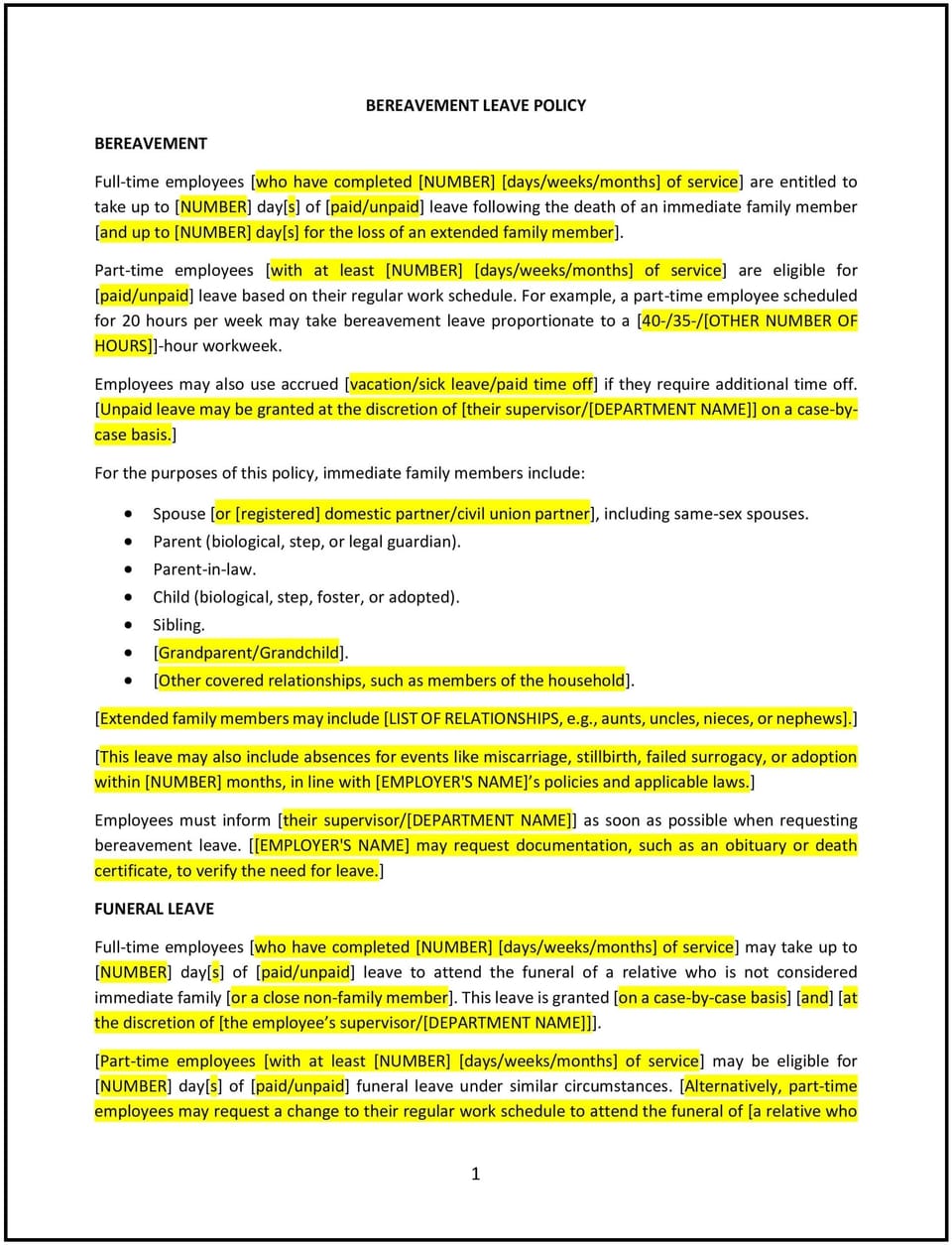Bereavement leave policy (Delaware): Free template

Bereavement leave policy (Delaware)
A bereavement leave policy helps Delaware businesses provide employees with time off to grieve and handle matters related to the death of a family member or loved one. This policy outlines the eligibility, duration, and procedures for requesting bereavement leave, ensuring a supportive workplace during difficult times.
By implementing this policy, businesses can foster compassion, promote employee well-being, and provide clarity on leave entitlements.
How to use this bereavement leave policy (Delaware)
- Define eligibility: Clearly state which employees qualify for bereavement leave and what relationships (e.g., immediate family, extended family) are covered.
- Specify leave duration: Provide details on the amount of leave offered, including whether it varies based on the relationship or other factors.
- Outline the request process: Explain how employees should notify their employer of the need for leave, including required documentation or advance notice where applicable.
- Clarify compensation: Indicate whether bereavement leave is paid or unpaid and how it interacts with other leave entitlements, such as PTO.
- Maintain flexibility: Allow for additional leave or adjustments to accommodate unique circumstances, such as travel or cultural practices.
- Communicate expectations: Set guidelines for returning to work after bereavement leave and any available support services, such as counseling.
Benefits of using this bereavement leave policy (Delaware)
This policy offers several benefits for Delaware businesses:
- Promotes employee well-being: Supports employees during a challenging time, helping them focus on personal needs without fear of workplace repercussions.
- Enhances morale: Demonstrates the company’s commitment to empathy and support, fostering loyalty and trust among employees.
- Reduces ambiguity: Provides a clear framework for requesting and managing bereavement leave, ensuring consistency and fairness.
- Improves workplace culture: Reinforces a compassionate and supportive environment that values employees' personal lives.
- Aligns with best practices: Establishes a formal policy to handle bereavement leave consistently, reducing potential conflicts or misunderstandings.
Tips for using this bereavement leave policy (Delaware)
- Communicate the policy clearly: Ensure employees understand the eligibility, process, and benefits of bereavement leave.
- Allow for flexibility: Be open to accommodating additional leave or special requests based on individual circumstances, such as cultural or religious practices.
- Keep documentation simple: Avoid overly burdensome documentation requirements that may add stress during a difficult time.
- Provide resources: Offer information on employee assistance programs or counseling services to support grieving employees.
- Review regularly: Update the policy periodically to reflect changes in Delaware laws, workplace needs, or best practices.
Q: Why is a bereavement leave policy important for my business?
A: A bereavement leave policy provides clarity and support for employees during a difficult time, promoting well-being, trust, and a compassionate workplace culture.
Q: What relationships should be covered under this policy?
A: The policy typically covers immediate family members (e.g., spouse, children, parents) and may include extended family or significant others. Businesses can adjust this based on their specific needs.
Q: How much leave should be offered?
A: The standard leave duration varies but often includes three to five days for immediate family members. The policy should specify the duration based on the relationship and allow for flexibility when needed.
Q: Is bereavement leave required to be paid?
A: Delaware does not mandate paid bereavement leave, but businesses can choose to provide it as a paid benefit to support their employees.
Q: How can employees request bereavement leave?
A: Employees should notify their employer as soon as possible and follow the outlined process, which may include providing basic documentation such as an obituary or funeral notice.
This article contains general legal information and does not contain legal advice. Cobrief is not a law firm or a substitute for an attorney or law firm. The law is complex and changes often. For legal advice, please ask a lawyer.


